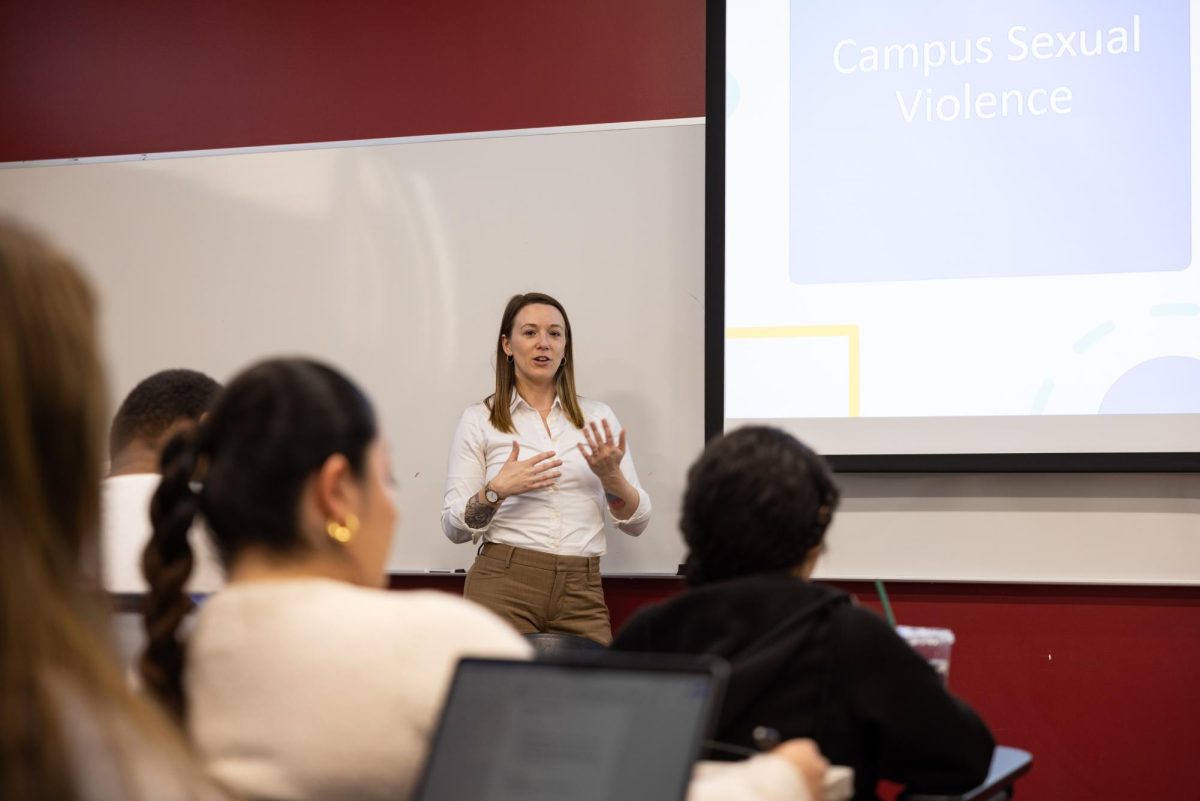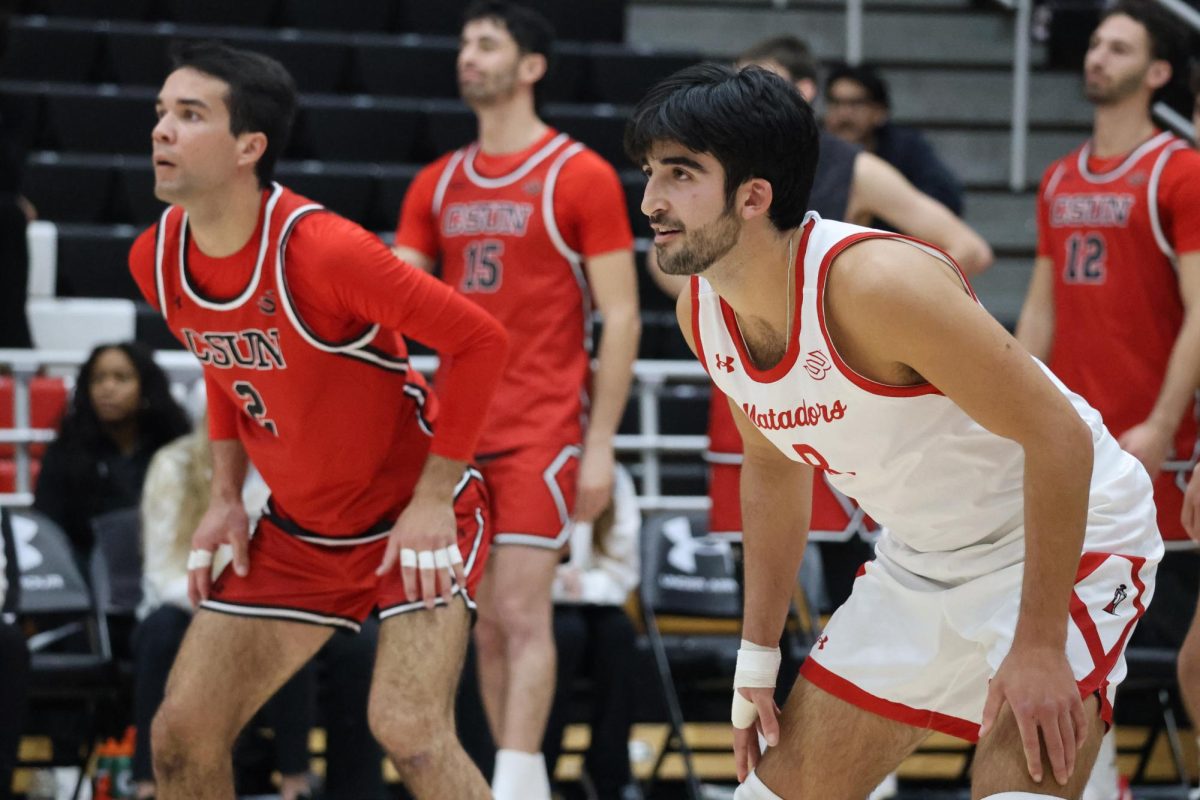In a Zoom video call, Katherine Lorenz fills the screen alongside her little dog, Kodiak. Her eyes begin to light up as she discusses a topic many would find difficult – sexual violence. For Lorenz, this isn’t just an academic pursuit but has become a calling.
Growing up in Michigan, Lorenz’s academic journey began with a simple observation about her family dynamics. Living with several siblings, she noticed differences in freedoms granted to her versus her brothers. While they could bicycle to local stores, her boundaries limited her to three houses down their street.
These early experiences with gender-based restrictions would later shape her academic career. Now serving in the Criminal Justice Department at CSUN, Lorenz has established herself as a prominent researcher in victimology, with an emphasis on sexual violence.
Lorenz’s academic journey began at the University of Illinois at Chicago (UIC), where she pursued a degree in sociology with a concentration in criminology, and later at Central Michigan University (CMU).
In 2010, as an undergrad at CMU, Lorenz participated in a victimology class exercise where students were asked to assess the responsibility of a sexual assault victim in a hypothetical scenario. Despite spending a semester discussing rape culture and victim blaming, Lorenz was the only student who refused to assign any sort of blame to the victim.
“That moment changed everything for me. We had spent months debunking these myths, and yet the majority of the class still blamed the victim,” she said.
Studies have found that one in four Canadian women will be sexually assaulted during their lifetime. In the U.S., there is an average of 293,066 victims of rape and sexual ages 12 or older assaulted each year, according to Georgetown University Law Center and Common Misconceptions About Sexual Assault from The Blue Bench Nonprofit.
Lorenz later pursued a Ph.D. at the University of Chicago, where she began to uncover the systemic issues disrupting sexual violence investigations and legal trials. Her research with the Chicago Police Department exposed a troubling reality – the criminal justice system often fails the people it promised to protect.
According to a report by the Department of Justice, “Women aged 18 to 24 who are college students are three times more likely than other women to experience sexual violence. Females of the same age who are not enrolled in college are four times more likely.”
“Sexual violence is notoriously difficult to prosecute,” Lorenz said. “There are rarely witnesses, and trauma can affect survivors’ memories, making them seem less credible in court. Our legal system isn’t built to support victims; it’s built to determine guilt or innocence.”
This realization inspired Lorenz to advocate for a shift in the approach. Rather than focusing solely on punishment, she calls for improving justice where offenders acknowledge their actions and work to repair the harm they’ve caused.
“There needs to be more of a focus on society’s views of crime rather than just on the punishment,” she said.
Lorenz stresses that society’s understanding of justice must go beyond incarceration. Her research emphasizes that true societal healing requires a more comprehensive approach that centers on victim recovery, community restoration and prevention.
“Most survivors I know aren’t looking for their perpetrator to be incarcerated,” she said. “What they want is acknowledgment, understanding and healing. Especially when the perpetrator is someone they know, like a co-parent or a partner, incarceration doesn’t always feel like justice.”
Despite progress in recent years, Lorenz notes that misconceptions surrounding sexual violence remain. She points out that these misconceptions often lead to inadequate funding for survivor support services and prevention programs, creating a cycle where outdated beliefs hinder progress in addressing sexual violence effectively.
“There’s still this idea of ‘stranger danger.’ That sexual violence only happens in dark alleys with an unknown attacker,” she said. “But the reality is that most survivors know their assailants, which complicates everything from reporting to seeking justice.”
Lorenz also focuses on a significant challenge – the inconsistency in consent laws across states. She advocates for more standardized approaches to nationwide consent laws, arguing that a more transparent, consistent legal structure would better serve survivors and the justice system.
For example, in California, there are strict consent laws. According to the California Penal Code § 261.6, “Consent is defined to mean positive cooperation in act or attitude pursuant to the exercise of free will. The person must act freely and voluntarily and have knowledge of the nature of the act or transaction involved.” While in other states, a person must be incapacitated to a certain degree for it to be considered sexual assault.
According to Lorenz, the digital age has introduced more challenges to sexual violence. Lorenz has deep concern about newer forms of sexual abuse, such as sextortion, revenge porn and the non-consensual sharing of intimate images.
A 2016 survey by Data & Society and the Center for Innovative Public Health Research found that 3% of American internet users aged 15 or older have received threats to post nearly nude or nude photos or videos of them online.
“It’s terrifying how something can be on the internet forever,” Lorenz said. “We’re facing a whole new frontier of exploitation and abuse that our legal system isn’t equipped to handle.”
Beyond research and teaching, Lorenz volunteers as a legal advocate and crisis counselor with organizations like Peace Over Violence. This hands-on experience informs her approach to supporting survivors. The combination of academic expertise and hands-on advocacy enables Lorenz to bridge the often wide gap between theory and practice in victim support services.
“If someone decides to go through the legal system, I always recommend having a legal advocate,” Lorenz said. “The state is advocating for itself, not the victim. The system isn’t set up to support survivors, so having someone familiar with the process can be essential to ensuring their rights are respected.”
Despite improvements in the system, such as initiatives to address rape kit backlogs, legal obstacles remain. The situation is further complicated by disparities in how different jurisdictions handle sexual assault evidence. While some cities and states have implemented tracking systems allowing survivors to monitor the status of their kits, others still lack basic inventory systems. Lorenz advocates for standardized protocols across jurisdictions and dedicated funding streams to ensure consistent, timely processing of all sexual assault evidence.
Lorenz insists that more work remains. She fights for a comprehensive repair of how society addresses sexual violence, from prevention education to support services and legal proceedings. “We need a more compassionate, survivor-centered approach,” she said. “One that prioritizes healing and accountability over punishment.”
As she prepares to end the call, it’s evident that Katherine Lorenz will remain at the frontlines as a spark for change, offering hope to survivors. Her steadfast commitment to boosting survivors’ voices and reshaping societal knowledge of justice is a powerful reminder of the sincere and significant impact one individual can have.












